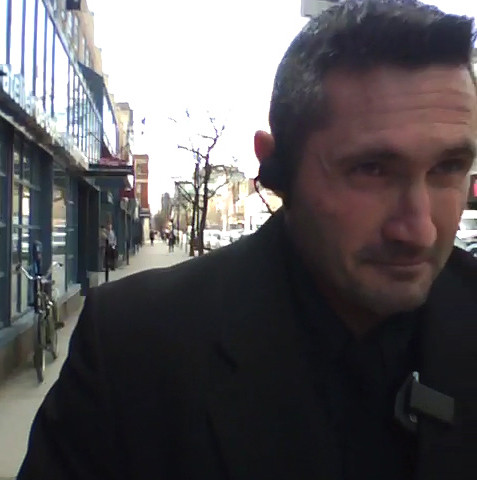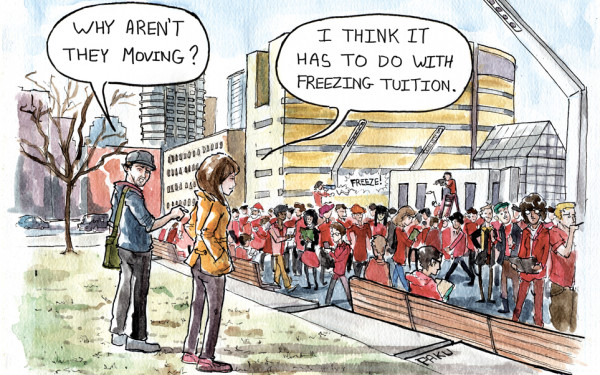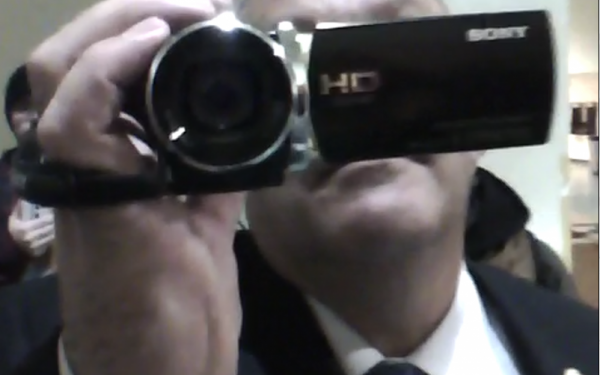Scrutinizing Security
Security Agent at Concordia Discovered Without License
Concordia University security is falling under further scrutiny after the security officer involved in the assault of a student on March 23 has been revealed to not possess a valid security permit.
A document shared with The Link revealed that the security guard in question is not a licensed agent with his employer, Agence de sécurité Maximum Inc.
“Following verification with his employer, […] we have been advised that he does not hold a security permit at this moment,” said Concordia Security Acting Director Jacques Lachance in the written response to a formal complaint filed against the agent requesting his name and license number.
“The university told us on [March 30] that this person was under review,” said Concordia Student Union VP External Chad Walcott. “Then we found out that he wasn’t even licensed at all, which leads me to believe that the university lied to us, or they themselves were lied to.
“Every security agent that is on the university premises is supposed to be a licensed individual. These individuals are also all supposed to be providing students with licenses when requested, and to fail to do so is a violation of the Private Security Act.”
According to section four of Quebec’s Private Security Act, “Any person operating an enterprise that carries on a private security activity must hold an agency license of the appropriate class.”
Any agent in violation of section four is guilty of an offence and liable to a fine of $500 to $5,000. Additionally, if convicted, the agent in question is liable to be found in contempt of several other sections of the act.
Amber Gross, the McGill student who was the victim of the alleged assault, filed a complaint against the agent and asked Concordia security to investigate. Gross says she was encouraged by a Concordia security officer to pursue a formal complaint with the security department.
Gross was part of a group of Concordia and McGill students demonstrating outside of a class in the Faubourg Building, reportedly there reminding students that their associations were still on strike.
“It was sort of our way of responding to the fact that security was going to be ramped up on each one of our campuses,” said Gross. “We were reaching out to each other and providing mutual support between the two campuses.”
Though some have questioned Gross’s involvement in strike action on the Concordia campus in the first place, others have pointed out that this undermines a much greater issue.
“The fact of the matter is that before she was struck there was no verification of whether she was a Concordia student or not,” said Walcott. “Furthermore, the job of security is to ensure the general safety of students.”
“If one of our security agents that our university is employing is harassing students, that’s a serious problem, regardless of where the student was from.”
Concordia hires private security agents from several private firms, most notably Maximum and CCC.
“Providing Concordia with a non-licensed individual does not satisfy the University’s expectations nor Maximum’s contractual obligations to us,” said Lachance in the letter.
Concordia University spokesperson Chris Mota agreed, and said the university is following up with an investigation.
“We should expect to have fully trained and competent people,” said Mota. “We are pursuing that with the employer. Our expectations are that when we contract with a supplier that they will be supplying us with agents that are fully credited.”
According to the document, the individual’s application for a security permit is in progress with the Bureau de la sécurité privée. The individual in question has been reassigned and is no longer working at Concordia.
Due to privacy legislation and the investigation of this case, the agent’s name is not being released. For this same reason, Lachance was unavailable for comment.

_800_531_800_531_90.jpg)





_600_375_90_s_c1.jpg)

